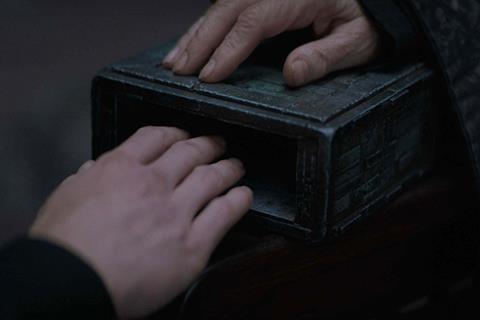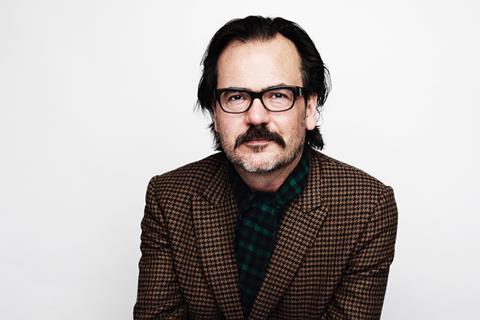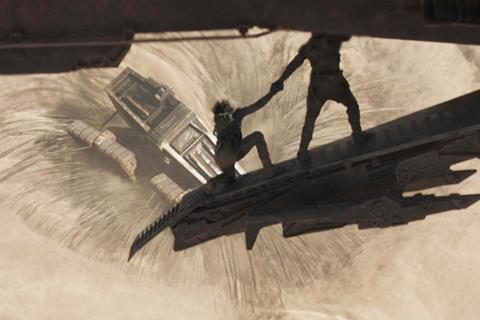With Dune, Joe Walker has edited his fourth feature for director Denis Villeneuve — and has been rewarded with Bafta and Oscar nominations. Screen talks to him about his 30-year career, from UK TV to blockbuster Hollywood.

When London-born, Los Angeles-based film editor Joe Walker was six years old, he would repair the joins in his parents’ 8mm home movies if the projector bulb burnt the film. Fifty-two years later, Walker — who is nominated for a Bafta and Oscar for editing Dune — is doing pretty much the same thing, albeit on a bigger scale than that precious family footage.
Following a music composition degree at the University of York, Walker joined the BBC as a trainee sound editor in the late 1980s. “I assisted some very fine editors. I worked with Pam Bosworth, whose vintage was she’d whistled in The Bridge On The River Kwai. We worked on a documentary about [Ernest] Hemingway, then a drama, and I learned a lot.”
His big break as sound editor was miniseries First Born, on which he met future film composer Hans Zimmer, before seguing into picture editing with music documentaries, magazine shows and wine programmes, as well as composing for children’s television. But Walker was eager to return to drama, working his way up as an editor through “police procedurals Jonathan Creek and The Lakes”, before finally moving into film.
After cutting Rupert Wyatt’s The Escapist, Walker met artist-turned-filmmaker Steve McQueen through cinematographer Sean Bobbitt, and the pair hit it off. McQueen was looking for an editor for his debut feature Hunger, about IRA hunger-striker Bobby Sands, and Walker connected with the filmmaker, talking about growing up in a Catholic family.

McQueen followed Hunger with Shame, which won Walker a European Film Award and “increased my profile”. But after working on documentary Life In A Day, he set his sights on Hollywood. “I wanted to go up a level in terms of the budget and the reach of the films I was cutting,” he says. “I was sent a bunch of scripts but they were all awful. I remember my agent saying, ‘They don’t get you [in America]. They don’t get you at all.’ Then 12 Years A Slave came along, and they got me.”
Walker’s third collaboration with McQueen, 12 Years A Slave scored his first Oscar nomination and opened “a big door into American filmmaking. Michael Mann was watching, and he picked me.” Editing techno-thriller Blackhat for Mann was an eye-opener for someone more used to UK TV and independent movies. “Hunger was me and Steve in a basement in Great Pulteney Street [Soho, London], living with a certain level of damp. I was assisting myself, we bought our own lunch and often made it. Working on a Michael Mann film there are three editors, nine music editors, four sound editors and corridors of people working to get this film up off the ground.”
Dream partner
Post-Oscars, Walker’s agent asked which directors he would most like to work with and he mentioned Denis Villeneuve, having admired 2010’s Incendies. “I can’t remember having been more moved by a film. I came out of it torn to pieces. It’s something both Steve and Denis have, that ability to tell a story in resonant images as well as in dialogue and in performance. I wanted to work with that mind.” It so happened that Villeneuve was looking for an editor for Sicario, and the pair began a collaboration that continued with Arrival, Blade Runner 2049 and Dune, for which Walker receives his third Oscar and fourth Bafta nomination.
Adapted from Frank Herbert’s epic novel, Dune — or, more accurately, Dune: Part One — clocks in at 155 minutes, although Walker’s initial assembly was shorter. “There is a faster version you can make of Dune if you wanted to cut back low-hanging fruit. One of the biggest challenges was establishing all the factions and main characters and being able to get insight into their souls before they get thrown into the oven. So the film grew in length and, as a consequence, got better.”
The additional running time allowed Walker and Villeneuve to flesh out the visions of Paul Atreides (Timothée Chalamet), which “by and large weren’t there in the first cut. That was another thing that emerged, trying to pepper images into the structure, so Paul’s inner life has a sense of destiny and progression.”
Given the scale, complexity and visual effects involved in Blade Runner 2049 and Dune, Walker’s role begins before a frame has even been shot. “I like to be near set. I don’t like to be on set. On Sicario and Arrival, I wasn’t on set, but the number of VFX shots was much lighter. Blade Runner was starting to get into 1,000-plus VFX shots, Dune even more so. There are some things that need to be sharpened up when they’re in the pre-vis stage, because those cuts need to be a complete template for all the other units working on it. It’s very important to be around early enough to have access to Denis before things get too crazy. I’m also always there to say, ‘We might need a shot for that.’”
With Dune, Walker was in Hungary two weeks prior to filming. “It’s not a lot but it’s enough to look at the big scenes that were important to Denis,” he says. “He wanted to have a cut of those before he shot them with the actors. And we could change them.”
One of the most challenging was scene 52, where the Atreides land an ornithopter in the desert to save workers from a spice harvester as a worm approaches. “That was storyboarded, then pre-vised, but it doesn’t have the dialogue, which I do with temporary voices and stitch together to work out what the scene is going to feel like. We worked on that for weeks before they shot.”

In the editing room, Villeneuve is omnipresent but never prescriptive. “Denis is normally four feet to my right, and we’ve spent the last seven years like that” says Walker. “But it’s a true collaboration. He goes into the shooting with such a strong plan. He storyboards extensively, and it’s more than just a shopping list of shots.
“None of us particularly stay in our lanes. It’s very holistic,” Walker continues. “My relationship with sound means I can bring a little something to it. Hans [who provided the score for Dune] had things to say about the edit. I would record sound. Sound would come up with dialogue. Denis embraces good ideas, but I’m entering something that’s at such a high level already. He talks to me like I’m an actor. He will identify a direction to go in and leaves me to find a path. It means you really own the edit, which is such a compliment.”
Initially, Walker will cut to temp music, often using pieces by Zimmer. “It was a miracle to watch Hans but we would work hand-in-hand. He would give us a piece of music that wasn’t necessarily destined for a scene, then we would find bits in it that were going to work for our story and place it.” An example is when Paul is subjected to a deadly test by Charlotte Rampling’s Reverend Mother. “That was one of those discoveries where we heard a recording, it wasn’t destined for anything, so I cut that in. I sent it to Hans, he rearranges that little section and we start rebuilding the cut. It’s a lovely collaboration.”
It is one that is set to continue with Dune: Part Two. “I’m happy to follow Denis onto Dune: Part Two and beyond,” says Walker. “We’re going back to Arrakis, hopefully this summer. I’m bracing for a fast turnaround; it’s going to be a year to get the thing together. Dune was 20 months, but the pandemic cut a big hole in that schedule.
“Dune: Part Two is going to be a very different film,” he adds. “We don’t have to set up every faction in the universe. A lot of that’s already done.”






![The Brightest SunScreen[Courtesy HKIFF]](https://d1nslcd7m2225b.cloudfront.net/Pictures/274x183/3/5/0/1448350_thebrightestsunscreencourtesyhkiff_312678.jpg)


















No comments yet